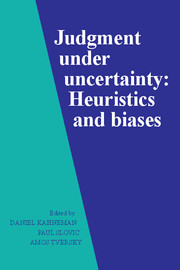Book contents
- Frontmatter
- Contents
- List of contributors
- Preface
- Part I Introduction
- Part II Representativeness
- 2 Belief in the law of small numbers
- 3 Subjective probability: A judgment of representativeness
- 4 On the psychology of prediction
- 5 Studies of representativeness
- 6 Judgments of and by representativeness
- Part III Causality and attribution
- Part IV Availability
- Part V Covariation and control
- Part VI Overconfidence
- Part VII Multistage evaluation
- Part VIII Corrective procedures
- Part IX Risk perception
- Part X Postscript
- References
- Index
3 - Subjective probability: A judgment of representativeness
Published online by Cambridge University Press: 05 May 2013
- Frontmatter
- Contents
- List of contributors
- Preface
- Part I Introduction
- Part II Representativeness
- 2 Belief in the law of small numbers
- 3 Subjective probability: A judgment of representativeness
- 4 On the psychology of prediction
- 5 Studies of representativeness
- 6 Judgments of and by representativeness
- Part III Causality and attribution
- Part IV Availability
- Part V Covariation and control
- Part VI Overconfidence
- Part VII Multistage evaluation
- Part VIII Corrective procedures
- Part IX Risk perception
- Part X Postscript
- References
- Index
Summary
Subjective probabilities play an important role in our lives. The decisions we make, the conclusions we reach, and the explanations we offer are usually based on our judgments of the likelihood of uncertain events such as success in a new job, the outcome of an election, or the state of the market. Indeed an extensive experimental literature has been devoted to the question of how people perceive, process, and evaluate the probabilities of uncertain events in the contexts of probability learning, intuitive statistics, and decision making under risk. Although no systematic theory about the psychology of uncertainty has emerged from this literature, several empirical generalizations have been established. Perhaps the most general conclusion, obtained from numerous investigations, is that people do not follow the principles of probability theory in judging the likelihood of uncertain events. This conclusion is hardly surprising because many of the laws of chance are neither intuitively apparent, nor easy to apply. Less obvious, however, is the fact that the deviations of subjective from objective probability seem reliable, systematic, and difficult to eliminate. Apparently, people replace the laws of chance by heuristics, which sometimes yield reasonable estimates and quite often do not.
In the present paper, we investigate in detail one such heuristic called representativeness. A person who follows this heuristic evaluates the probability of an uncertain event, or a sample, by the degree to which it is: (i) similar in essential properties to its parent population; and (ii) reflects the salient features of the process by which it is generated.
- Type
- Chapter
- Information
- Judgment under UncertaintyHeuristics and Biases, pp. 32 - 47Publisher: Cambridge University PressPrint publication year: 1982
- 74
- Cited by

